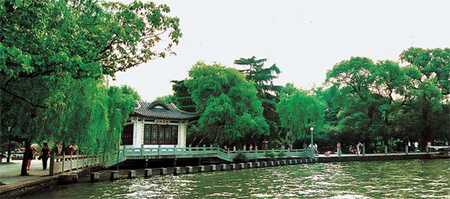Qixi - literally the "night of sevens" - is the nearest Chinese equivalent to the Western St Valentine's Day tradition. Unlike its overseas counterpart, the date of Qixi is governed by the lunar calendar and always falls on the seventh day of the seventh month of this traditional system. This year the festival takes place on August 26th and already bookings for romantic getaways are going off the scale.
 |
|
Hangzhou's West Lake, the meeting place for many lovers in the myths and legends of ancient China. |
According to Ctrip.com, one of the country's leading tourism portals, the number of lovers looking for a little "us time" has risen by 50 percent compared to the same period last year - perhaps enduring proof that affairs of the heart can transcend any abiding financial gloom.
Unsurprisingly, one key beneficiary of this upsurge in amorous awaydays is Hangzhou, capital of eastern China's Zhejiang province, but also widely acclaimed as the country's "capital of love". Its romantic resonance stems from its long association with two of China's classic love stories: "The Legend of the White Serpent" and "The Butterfly Lovers".
Both stories tell of star-crossed lovers. In "The White Serpent", a young man falls in love with a beautiful girl and marries her but, unbeknown to him, she hides a dark secret - she is actually a huge white serpent disguised by a magic spell. The two lovers are then split asunder when a local monk betrays her secret.
"The Butterfly Lovers" has often been compared to the tale of Romeo and Juliet, except with a considerably greater degree of cross-dressing. Here a young woman disguises herself as a boy in order to secure an education. She spends three years sharing a room with a male classmate who never guesses her secret. She, however, falls in love with him.
When the truth is finally out, the two decide to marry, but their happiness is short-lived. The girl's father insists she marry another and the young man dies of a broken heart. The two are ultimately united when the girl visits her dead lover's tomb on her wedding day and the couple are transformed into a pair of butterflies.
Hangzhou and its environs are replete with beautiful, romantic locations, many of which provided the settings for the two classic tales of doomed love. By the West Lake, there is the Broken Bridge, supposedly the site where the snake woman first spied her lover-to-be. Tucked away on Fenghuang Mountain is the Wansong Academy, said to be the school where the two Butterfly Lovers shared a room.
Aside from its associations with these ancient love stories, the area has a number of other romantic connections. By the West Lake there is the tomb of Su Xiaoxiao, a famous beauty from the Southern Qi Dynasty (479-502). There is also the rocky plinth that was the scene of the celebrated May-December romance between a renowned writer, Su Dongpo, and a much younger singer, Qin Cao, during the period of the Song Dynasty (960-1279).
Capitalizing on these torrid tales, sensual sites and love-themed locations, the local tourism agencies have developed a variety of wedding celebration packages, including the "Rose Wedding". Organized once a year by the Hangzhou Commission of Communist Youth Leagues in China, it inevitably attracts a considerable number of young couples, as does the "Honeymoon Tour to Hangzhou", one of 14 national special travel routes approved by the China National Tourism Administration.
(China Daily August 22, 2009)